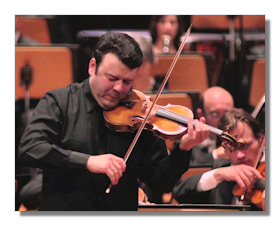
The Internet's Premier Classical Music Source
Related Links
- Latest Reviews
- More Reviews
-
By Composer
-
Collections
DVD & Blu-ray
Books
Concert Reviews
Articles/Interviews
Software
Audio
Search Amazon
Recommended Links
Site News
 Concert Review
Concert Review
Piotr Ilyitch Tchaikovsky

Tchaikovsky Festival
- The Voyevoda, Op. 78
- Violin Concerto in D Major, Op. 35
- Symphony #6 in B minor "Pathétique", Op. 74
Vadim Gluzman, violin
Belgian National Orchestra/Andrey Boreyko
Brussels, Centre for Fine Arts, 22 March 2015
For four days the Belgian National Orchestra (BNO) and their music director Andrey Boreyko paid homage to Pyotr Tchaikovsky. The choice of works in this mini-festival may have been limited but was nonetheless select, with two programs featuring the rarely heard symphonic ballad The Voyevoda, the Violin Concerto, and either the Suite #3 or the Sixth Symphony.
At the Brussels concert that I attended ending with the Pathétique Symphony, the highlight was once again the performance of the Violin Concerto. After Janine Jansen, not even three weeks ago, it was Ukrainian-born Israeli Vadim Gluzman who treated the audience in the Centre for Fine Arts to an extraordinary reading of this concerto. It's great to hear that so many artists of the younger generations can find such fresh and interesting angles on an old warhorse like this. Less emphatic than Jansen, but no less compelling by his tonal beauty and superb intonation, genuine lyricism and natural bravura, Gluzman owns the secret to astonish without forcing anything. He had already received enthusiastic applause after the first movement before a lovingly shaped and subtly touching Canzonetta, topped by an excitingly driven Finale readily brought the house down. Andrey Boreyko was a very attentive and careful accompanist, even if the beguiling spectrum of color and warmth that Gluzman conjured from his instrument wasn't always matched by the orchestra. Interestingly, Gluzman plays the Stradivarius owned by the dedicatee of Tchaikovsky's concerto, Leopold Auer – who, as is well known, refused to perform it at first, but eventually did with his own alterations. A stunning instrument, played by a stunning artist.
The Voyevoda had in the opening pages plenty of thrust and a finely shaped middle section. Color and transparency are key in this fascinating late-Tchaikovsky score and at first it sounded that Boreyko was going to reveal plenty of unheard orchestral details. In fact, much of these "discoveries" resulted from a balance that favored woodwinds and brass. The slightly smaller than usual body of strings (anchored on only 6 basses) was frequently found at a disadvantage in both The Voyevoda and the symphony. (I never thought of The Voyevoda as a concerto for bass clarinet, but here we came close.) During softer passages there was plenty to enjoy with the BNO in good form and Boreyko paying attention to Tchaikovsky's string textures. Yet as soon as more sections joined in, the winds began to dominate the sound picture and when the brass and percussion followed suit, the balance was often totally lost. Tutti were loud and harsh, and trombones and tuba sounded like an extra added section, rather than an integrated part of the ensemble. It may have been the sonority that Boreyko wanted, but it threw a lot of the composer's careful dynamic and tempo indications overboard, and that's seldom a good idea.
The recently heard Mikhail Pletnev with the Russian National Orchestra also paid a lot of attention to woodwinds and brass, but in their case the balance was wholly convincing, not to mention the special sonority of the Russian winds which makes the instruments of the Belgian orchestra sound rather indifferent, no matter how well played.
Boreyko's traversal of Tchaikovsky's final symphony, dark and unsentimental, packed quite a punch, although it was more outwardly spectacular than genuinely moving: generally well-paced (except for a lumbering third movement), very detailed, and underpinned by dark colors but also startling, sometimes grotesque sonic effects. It wasn't the most subtle reading though, nor the most consistent. As said, the orchestral balance remained an issue and maestro Boreyko was more than once taking cue from his own musical instincts rather than from the composer's. The changing climates of the first movement were fluently conducted, the development was exciting until the brass went all over the place in the climax, not to mention that the return of the principal theme marked Andante come prima was flawed by the loud entrance of the orchestra which ignored the "con dolcezza" notation. Winds and horns obscured the string lines in an otherwise agreeable Waltz, where the softer passages did hint at a deft handling of light and darkness. There was a long burst of applause after the third movement, although it was for my money the least convincing of all, ending in a rather demonstrative sonic explosion from percussion and brass. The Finale built up to harrowing climaxes, expressing rage rather than acceptance of fate. The bassoons and the stopped horns created brilliant effects, but there were also slips in the ensemble and unfortunately the closing pages took off too loud again for the final descent into oblivion.
A Belgian orchestra paying tribute to Tchaikovsky is far from obvious. A few bumps along the way are unavoidable, yet eventually this mini-Tchaikovsky festival stressed the music's timeless appeal and had a revelatory performance from Vadim Gluzman to boast. And that's no minor achievement.
Copyright © 2015, Marc Haegeman












